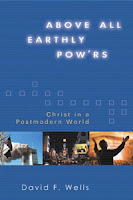Last night we finished our summer book club, concluding our discussion on St. Athanasius' On the Incarnation first and G. K. Chesterton's Heretics second. Throughout this time, I have read other books, one of which was the last Harry Potter novel. I tend to keep quiet about the Potter novels because I know some folks are uncomfortable with the idea and presence of magic. But though I've been quiet, I'm not apologetic about reading the books because they are simply great stories.
What might Potter have to do with Chesterton? Wonderfully, Alan Jacobs explains: in Heretics, Chesterton ably defends what he calls the "penny dreadfuls", unsophisticated, even unliterary works of popular fiction. Books with exotic locations, roaring stories and simple characters. Jacobs nicely argues that the 3500 pages of Potter might be the greatest penny dreadful ever written.
Really, just read Jacobs' article. It is outstanding as is everything I've read of his. [Note: it won't make much sense to folks who haven't read the books. But if you are a Potter opponent, it would be good for you to see the other side, to understand why some conscientious Christians read them.]
My heart became hot within me. As I mused, the fire burned; then I spoke with my tongue: "O Lord, make me know my end and what is the measure of my days; let me know how fleeting I am!"
31 August 2007
28 August 2007
The New Spirituality

I've been reading (slowly) David Wells' Above All Earthly Pow'rs: Christ in a Postmodern World. Wells sets out to give a thorough overview of the postmodern worldview and then address the church on how to live and worship in this world. It is, so far, an outstanding book, setting itself head and shoulders above other worldview analyses I've read. Here are some quotes I thought you'd like.
On missions:
On missions:
The reality, however, is that America is theOn the new spirituality:
world's most religiously diverse nation now and from a Christian point of view it is as fully a mission field as any to which churches now are sending their missionaries. This is true, not only because of the arrival of these new immigrants with their diverse religions, but also because of the postmodern decay in American culture.
In religion of a Christian kind, we listen; in spirituality of a contemporary kind, we talk. In religion of a Christian kind, we accept a gift; in spirituality of a contemporary kind, we try to seize God. In the one, we are justified by the righteousness of Christ; in the other, we strive to justify ourselves through ourselves. It is thus that spirituality is
the enemy of faith.
...because the emerging worldview is not being engaged, the Church has little it can really say. Indeed, one has to ask how much it actually wants to say. Biblical truth contradicts this cultural spirituality, and that contradiction is hard to bear...Is the evangelical Church faithful enough to explode the worldview of this new spiritual search?
Jesus Glorified
Luke says that when Jesus returned to Galilee and began teaching in the synagogues, he was "glorified by all" (4:15). But then they tried to kill him. What gives?
Turns out Jesus' so-called glorification was the same type of glory he suffers from so many of us. We appreciate Jesus as a great teacher, we admire Jesus as an upright person, we even adorn him by saying nice things about him. And so we think we've glorified him. But the real test is when the devastation of the gospel comes home: when Jesus claims to have fulfilled all Scripture, when he points out our sin, when he claims divinity - this is when the world tries to push him off the cliff.
Thus as we seek to glorify our Savior, we must not settle for the "glory" this world gives him. We cannot be silent when people seek to relegate him to the category of Ghandi and Confucius and any other admirable religious-type folk they can remember. Jesus doesn't let himself be "admired" and we shouldn't either, whether in our hearts or in the minds and lives of our neighbors. You either worship him or you hate him. Any middle ground is pure fantasy.
p.s. - One possible reading of Luke 4:14-15 is that Jesus was glorified in the greater area of Galilee, but not in Nazareth. The problems with this are (1) the people's initial reaction to Jesus in Nazareth was one of supposed "glory" as well and (2) the people of Galilee didn't uniformly exalt Jesus as Lord in their hearts.
Turns out Jesus' so-called glorification was the same type of glory he suffers from so many of us. We appreciate Jesus as a great teacher, we admire Jesus as an upright person, we even adorn him by saying nice things about him. And so we think we've glorified him. But the real test is when the devastation of the gospel comes home: when Jesus claims to have fulfilled all Scripture, when he points out our sin, when he claims divinity - this is when the world tries to push him off the cliff.
Thus as we seek to glorify our Savior, we must not settle for the "glory" this world gives him. We cannot be silent when people seek to relegate him to the category of Ghandi and Confucius and any other admirable religious-type folk they can remember. Jesus doesn't let himself be "admired" and we shouldn't either, whether in our hearts or in the minds and lives of our neighbors. You either worship him or you hate him. Any middle ground is pure fantasy.
p.s. - One possible reading of Luke 4:14-15 is that Jesus was glorified in the greater area of Galilee, but not in Nazareth. The problems with this are (1) the people's initial reaction to Jesus in Nazareth was one of supposed "glory" as well and (2) the people of Galilee didn't uniformly exalt Jesus as Lord in their hearts.
24 August 2007
Update from Texas
We had a great trip to Texas and all accounts point to God's blessing in planting an RPCNA church. Last I heard the group will be called Brazos Valley Reformed Fellowship (since they're not really a church yet). The real kick-off is a fall Bible study meeting on Sunday afternoons/evenings, studying Scripture using the Westminster Shorter Catechism as a guide. Already a few families and individuals have expressed interest.
What can you do? Pray! Pray for Sean, who will be leading the study. Pray for the news to spread in a way that glorifies Christ and draws folks into the group. Pray for the Midwest presbytery as they oversee the work.
What else can you do? There may soon be an opportunity to give financially to this church plant; I'll let you know when I find out. Also, if you know folks or know of folks in the College Station/Bryan annex of Texas, let them know about the group!
p.s. - There are some new links to the right.
What can you do? Pray! Pray for Sean, who will be leading the study. Pray for the news to spread in a way that glorifies Christ and draws folks into the group. Pray for the Midwest presbytery as they oversee the work.
What else can you do? There may soon be an opportunity to give financially to this church plant; I'll let you know when I find out. Also, if you know folks or know of folks in the College Station/Bryan annex of Texas, let them know about the group!
p.s. - There are some new links to the right.
02 August 2007
Aren't you a little young for that?
 I used to hate it when people asked me that question; most kids do because they have dreams bigger than their bodies - why else was I trying to make a basketball shot when I could barely lift the ball over my head? (No jokes about that being last week, now.) But there are some things that being young never disqualifies us for - like being in worship or helping mom and dad around the house.
I used to hate it when people asked me that question; most kids do because they have dreams bigger than their bodies - why else was I trying to make a basketball shot when I could barely lift the ball over my head? (No jokes about that being last week, now.) But there are some things that being young never disqualifies us for - like being in worship or helping mom and dad around the house. Tomorrow morning I leave for a short (3 1/2 day) trip to Texas. One of Immanuel's founding families relocated to the College Station/Bryan area shortly before we began our first worship services last fall. As they've lived and worshipped and prayed in Texas, they began hoping God might be leading them to plant an RPCNA church in their new hometown. They've contacted the Midwest presbytery, who are intersted in investigating this new possibility; as a result, the presbytery has invited me to fly down for the weekend to minister to this family and talk about church planting stuff together.
This trip is part of God's answer to one of our prayers from the beginning of IRPC, that God might allow us to be used in planting other churches from the very beginning of our congregation's life; our desire is serious enough that we included church planting in our very first budget. To some this certainly seems counterintuitive - We aren't a mature church yet, why should we be extending ourselves to support a church plant in Texas? Isn't church planting something "old" churches do? Aren't we a little young?
Well, no. Because of the continuing force of the Great Commission, church planting is something every church should always have within their sights. We ought to seek and expect to see Great Commission-fulfilling in every part of the church's life. We ought to see our young people walking faithfully with Christ. We ought to see new people brought into the faith. We ought to see new churches planted. And we shouldn't wait for any of these. Many churches, especially in our denomination, are as small or smaller than we are; most have some sort of internal conflict which needs to be addressed (who doesn't?). But an outward focus - local outreach and wider church planting - will do something we never expect: it will help the local congregation to grow stronger. But even this isn't our ultimate motivation - we don't look outward to grow stronger internally (though this will happen). We look outward with the same motivation we seek holiness internally, to see the kingdom of Christ coming on earth as it is in heaven. We're never too young, or too old, for that.
If you're interested in reading more, here's a great article by Tim Keller on the why of church planting.
Subscribe to:
Posts (Atom)
